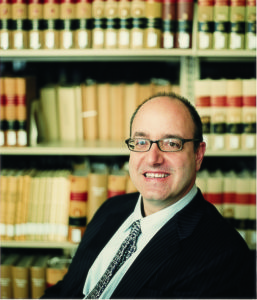From the Dean: Public Service and the Legal Profession
We live in a nation governed by the rule of law, which reflects a profound truth that law plays an especially important role here. We see this revealed in a myriad of ways—from Tocqueville’s famous quip about the litigiousness of American society, to the continued attractiveness of law as a career for brilliant young men and women, to the perennial popularity of legal drama in movies and TV shows.
Because law is so important, lawyers have been important too. It is striking how many of our Founders studied or practiced law. Even today, a majority of the Senate is composed of lawyers, and more than two hundred members of the House of Representatives similarly studied law. Lawyers have dominated the ranks of our presidents and governors and nearly every other position of public leadership. Nor does this tradition end with government service, for the ranks of social movements and public interest organizations from the Revolution to abolition to civil rights and property rights and abortion rights have been filled out, on both sides, by men and women with legal training.

Public service has, indeed, long been a core part of our mission as a profession. Lawyers serve their clients, but they work for the larger community too. And as our profession changes—as globalization and specialization and economic development pressure lawyers to treat their profession as a business and reshape how they work to ensure profitability—the need to encourage and celebrate this tradition becomes more important than ever. What’s at stake is not just whether lawyers will continue to play their historic role in American society. What’s at stake is the soul of the profession. Ceaseless reports of job dissatisfaction among young lawyers is very much a product of the sense that their jobs have lost the meaning and larger purpose that attracted them to the practice of law in the first place.
Obviously there are limits to what law schools can do to restore and preserve our profession’s sense of mission. We can, however, teach our students to appreciate the benefits of public service—both its importance to society and its power to enrich their own professional lives. In this issue of Stanford Lawyer, we explore some new and old ways in which Stanford Law School is seeking to do just this. Our message is simple: Serving the larger community is something every lawyer should make a part of his or her career. Indeed, the privilege to practice law carries with it a responsibility to do so.
Some graduates may want to make public service their whole professional life, and we support them in important ways, from special career advising to our generous loan forgiveness program. But full-time public service is not for everyone. The choice of a career is deeply personal and too important to impose any single model. Fortunately, choosing a career in the private sector is not inconsistent with fulfilling one’s obligation to serve the community. There are countless ways in which to do both. For some lawyers this may mean pro bono work; for others, moving back and forth between private and public sectors; for still others, finding ways to do private work that by its nature also serves the public.
Teaching students the value of public service involves more than telling them it is valuable. Our goal is to instill a sense of urgency in Stanford Law graduates, so that as pressures mount to focus their work along a single dimension, they will find the desire to take advantage of opportunities for public service. This is the central mission of the new Levin Center for Public Service and Public Interest Law, founded with a generous gift from John Levin ’73 (MA ’70) and Terry Levin (BA ’74, MA ’81).
Students come to law school with the hope that being a lawyer will enable them to serve their society and have meaningful professional lives. Our task is to nurture that aspiration and ensure that students have the tools to convert it into reality after they graduate.
